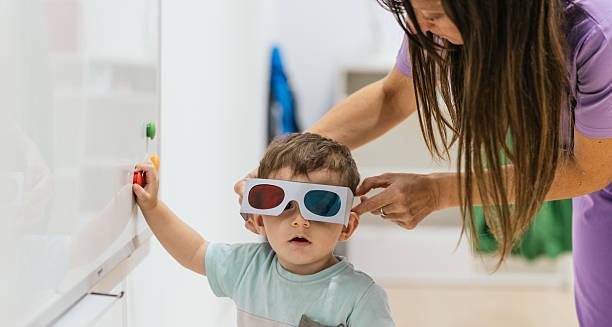Treatment of Colour Blindness
Treatment of colour blindness depends on the type and cause. For inherited forms of colour blindness, there is currently no cure. However, adaptive tools, lenses, and behavioural strategies can help people manage daily challenges. In acquired cases, treating the underlying cause may improve or restore colour vision.
1. Lenses and Glasses
Special tinted lenses are available that enhance colour contrast and help some people with red-green colour blindness distinguish between hues. These lenses can be worn as contact lenses or glasses and are particularly useful in specific tasks like identifying traffic lights or choosing ripe fruit. However, they do not restore normal colour vision and may not work for everyone.
2. Assistive Technology | Treatment of Colour Blindness
Smartphone apps, digital filters, and screen readers can assist with colour differentiation. Many apps allow users to point a camera at an object to identify its colour. Others adjust on-screen colours for better clarity. These tools are particularly helpful in educational and work environments.
3. Visual Training
Some studies have explored colour training programmes to help individuals improve colour identification using memory and pattern recognition. While these don’t change colour perception, they may reduce the functional impact of colour blindness in everyday activities.
4. Genetic Research
Gene therapy is a promising field, particularly for inherited red-green colour blindness. Animal studies have shown encouraging results, but clinical trials in humans are still ongoing. If successful, gene therapy could one day offer a permanent solution.
5. Managing Acquired Colour Blindness
If colour vision changes are caused by cataracts, glaucoma, or medications, treating the root issue can sometimes restore normal perception. In these cases, managing the disease or stopping the offending drug may halt or reverse the visual changes.
6. Support and Education | Treatment of Colour Blindness
Counselling and educational support can help children and adults cope with the emotional impact of colour blindness. Raising awareness among teachers, employers, and families is essential for creating inclusive environments.
While the treatment of colour blindness cannot currently offer a cure for inherited forms, the combination of adaptive technology, supportive tools, and workplace or classroom adjustments can make a significant difference.
[Next: Complications and Recovery from Colour Blindness →]


